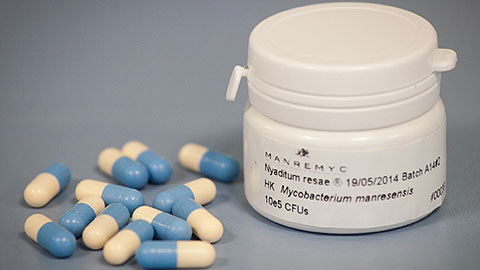Last trials before distribution of probiotics against tuberculosis becomes a reality

01/09/2014
Sixteen months after being founded, Manremyc, a spin-off from the Germans Trias i Pujol Health Sciences Research Institute (IGTP) - of which the UAB is a partner institute - has received an additional 300,000 Euros in funding. This will allow the company to complete its clinical trials and verify the efficacy of a food supplement which could reduce the risk of those infected with the bacteria from developing the disease. Manremyc will also be able to search for international partners who would make it possible to commercialise the food supplement for less than five euros per person and per year in countries with the highest rates of infections and death.
Manremyc is the result of the work carried out by researchers from the Germans Trias Experimental Tuberculosis Unit (UTE). Since 1997 this unit, led by lecturer at the UAB Dr Pere Joan Cardona, works on the study of the pathogenic mechanisms causing tuberculosis. For seventeen years, the unit has contributed with innovative data on the causes of the disease. Scientists have been able to conclude that the reason some people infected with the bacteria finally develop tuberculosis is because their body reacts to the bacteria with an overly intense inflammation, which ends up being harmful to the body itself. Once this was discovered, and after verifying that common anti-inflammatories could help cure the pathology, scientists decided to find a way to regulate this response and thus prevent the inflammation from becoming too exaggerated.
They thus created Nyaditum resae®, a food supplement manufactured with a mycobacterium unaffected by heat. The bacteria belongs to the same family as the one that causes tuberculosis, but can be found present in the environment. This mycobacterium, named Mycobacterium manresensis, was discovered in the Cardener River and first identified by researchers from the UTE. The probiotic, administered in pills during two weeks, teaches the body to tolerate the tuberculosis mycobacterium naturally, and therefore the inflammation generated is much less intense. The treatment aims to prevent the disease from developing, something scientists were able to prove happens in mice. They are now looking to verify its efficacy indirectly in humans in the following months, after gathering the results from the clinical trials and confirming the product's safety. “When you repeatedly take a probiotic orally, your immune system finally considers it food, and it gets used to it. That is how the body generates tolerance to this type of mycobacterium and doesn't react too intensely against the tuberculosis bacteria", Dr Cardona explains.
The support of several shareholders helped the spin-off begin the industrial production of this probiotic, carried out on the UAB campus thanks to agreements between the UAB and the UB. The UAB collaborates through its School of Engineering's Fermentation Pilot Plant, which has been in charge of developing the process of obtaining the probiotic at semi-industrial level. The collaboration also made conducting the clinical trials possible. These trials will confirm whether the supplement produces any side effects and that is works correctly in moderating inflammations.
One Million and a Half Deaths Each Year
Tuberculosis is an infectious disease produced when a bacteria from the Mycobacterium genus enters the body and normally settles in the lungs. In Catalonia, each year some 1,200 people who are infected with the bacteria develop the disease and some 10,000 are newly infected. The mortality rate is very low because infections are treated with antibiotics. In other places of the world, however, tuberculosis can cause up to a million and a half deaths each year, with 100 million new infections registered and eight million people developing the disease.
The Germans Trias Experimental Tuberculosis Unit is an internationally renowned centre. Its leadership in the design and evaluation of therapeutic strategies needed to fight against tuberculosis has helped it shape an international network of collaborators. One of the unit's first ground-breaking contributions was the dynamic hypothesis, which sustained that the bacteria causing tuberculosis do not settle once they arrive to the lung tissue, but reproduce and become part of the aerosols generated in the lungs, and thus are able to reinfect other tissues. This causes constant lesions, which the lung envelops with collagen fibres in an attempt to reduce the bacteria's ability to move and produce reinfections.
Apart from the dynamic hypothesis, scientists also have demonstrated that those infected with the bacteria finally develop the disease due to their body's inflammatory reaction, which is very intense and causes the tuberculosis lesions to increase in size. The unit also created a vaccine to treat latent infections, the "Vacuna Ruti", which is currently being developed by the biotech company Archivel Farma.